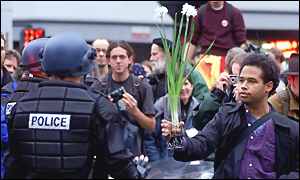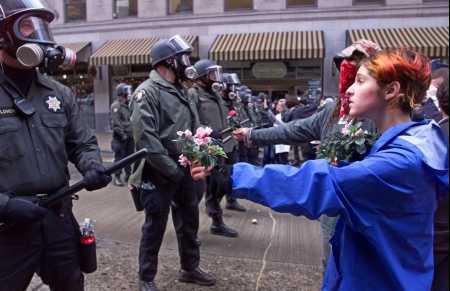|
“There is no way that those
of us who live in Washington, D.C. would condone any destruction of properties
in Washington, D.C....One of things that you do when you stand up and you
take moral leadership is to declare what is condoned and that which is
not condoned, that which is outside the guidelines of what you have gathered
for...so all the world can see the sins of the current structure...We will
be engaged in nonviolent direct action....We will not condone the destruction
of property, the hurting of individuals by other individuals and by law
enforcement..." Rev. Grayland Hagler of the Plymouth United Church
of Christ in Northeast D.C., March 14, 2000 at Mobilization for Global
Justice Press Conference.
|

